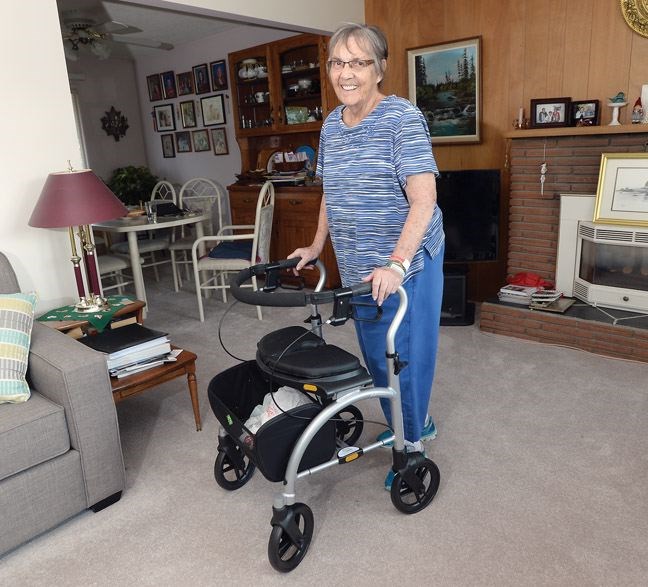After two months in the hospital recovering from back surgery, Patricia Coutts is leaving with a walker wishing she'd had physiotherapy to help her stand on both feet again.
But staffing shortages mean the University Hospital of Northern B.C. needs to focus on acute inpatients.
"I could have had physio and probably not be walking on that walker right now," said Coutts, 76, before she was released Friday. "I don't think it's going to take a lot of physio, but I know that it's going to take some... to get me walking freely and independently.
"There was certainly patient time for me to do that, there wasn't physiotherapy time but you're in a place where it's fully equipped for you to do that, it would be nice to be able to do it if there were enough physio."
Northern Health acknowledged it has a shortage of physiotherapists at the hospital, with three positions vacant since May. Two have been filled, with expected start dates in October.
"We are working on a number of campaigns, offering incentives to attract physiotherapists," said spokesman Steve Raper by email.
"The outpatient programs have been affected as we focus on acute inpatients at UHNBC," he said. "Any patient with a referral to physiotherapy from a physician is a candidate to receive the service."
That's part of the problem. Coutts's doctor couldn't give her a referral when she asked for one.
"He wouldn't even put in a request for it," she said. "His answer was I can't refer you to hospital physio, they're already too busy and there are not enough physiotherapists to cover what they're trying to handle now."
When fully staffed, the hospital offers three outpatient programs to neurology, orthopedic and pediatric outpatients, Raper said.
Prince George isn't unique. The entire region is experiencing shortages with only 3.3 per cent of the province's physiotherapists expected to cover seven per cent of B.C.'s population. According to 2014 data from the Physiotherapists Association of B.C., the north has three times fewer physiotherapists than the rest of B.C.
Coutts, who has osteoarthritis, has helped run an arthritis support group for more than 15 years. Through it she's built contacts in the health system, so she considers herself lucky to be able to turn to them for advice, but worries about others without similar supports.
Physiotherapist Terry Fedorkiw has spoken at those meetings and describes Coutts as a motivator. When she visited Coutts in the hospital, it was tough to see her bedridden and immobile.
"That contributed to her demise because she wasn't moving and if you don't move you deteriorate," said Fedorkiw.
"She is a candidate who has the potential to improve," said Fedorkiw, adding people - especially seniors - can weaken fast without movement and strengthening. "The solution is to have more access to physiotherapy."
Margaret Jackson, who coordinates the arthritis support group, said she's seen many members who would benefit for more access to physiotherapy, both public and private.
"Physiotherapy helps so many people, not just with arthritis but with all types of limitations to mobility and when you can take care of those issues, the mental capacity becomes better as well. It helps stop that cycle of going into the depression so physiotherapy is more than just physical assistance, it's an all-encompassing sort of thing," said Jackson, who also works as an administration with the Project Friendship Society, a non-profit that connects people with disabilities to community support.
"That is one of our struggles: to make sure that we advocate for stronger support for physiotherapy for all of people."
Coutts said she's frustrated when she hears about a different level of care offered in other parts of the province, like her sister in Victoria who received twice a week physio for five months after her knee surgery.
"Do we need a training school for physio? Absolutely. We need to train them in the north," Coutts said of the overall shortage and local push to bring a program to Prince George similar to the Northern Medical Program for physicians.
Coutts wasn't using a walker before her surgery and she's determined to get back there again. She said she'll be working out in the pool and plans to go the private route, though she knows that may take time.
"It would allow (people) to go home, rebuild their life and do some of the things that they were able to do before."



